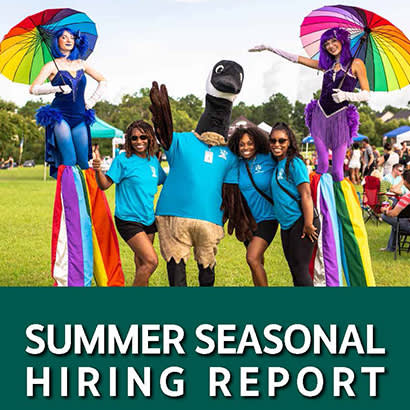
For an enhanced digital experience, read this story in the ezine.
Summer fun and parks and recreation go hand in hand. However, the influx of visitors and program participants during the summer can be taxing on year-round park and recreation staff. Ranging from maintenance and landscaping professionals to summer camp staff and lifeguards, the summer seasonal workforce is a lifeline to regular park and recreation professionals, but recruiting and retaining this workforce can present challenges. The Summer Seasonal Hiring Report, a new NRPA research report released in February, explores the summer seasonal hiring process, identifies some of the hiring challenges agencies nationwide faced in 2023, and highlights how park and recreation professionals are addressing those challenges.
Key Findings
Nearly all park and recreation agencies (97 percent) hired summer seasonal staff in 2023. While those temporary staff members’ day-to-day responsibilities may differ from agency to agency, the most hired summer seasonal staff positions included summer camp staff (79 percent of agencies), lifeguards (66 percent) and maintenance workers (63 percent).
Parks and recreation provides first-time job experience for many teens and young adults. Five in six park and recreation summer seasonal employees in 2023 were under the age of 24. Local schools and colleges/universities play a vital role in the recruitment of summer seasonal workers. Seventy-three percent of park and recreation agencies partner with their local school systems to find seasonal workers, while 64 percent look to local colleges and universities.
Recruiting and hiring summer seasonal staff can be a long process. Most park and recreation agencies started their summer seasonal recruitment in February, aiming to have this temporary workforce in place by May. More than half hired at least 90 percent of their budgeted summer seasonal workforce hours in 2023. Agencies serving communities of less than 50,000 residents were more likely than their peers serving larger jurisdictions to successfully meet their summer seasonal workforce hiring targets.
Six in seven park and recreation agencies took actions because of a shortfall in summer seasonal staff in 2023. Fifty-six percent of park and recreation agencies leaned on full-time staff to cover unfilled seasonal hours, while a third of agencies increased hours among permanent part-time staff or shifted their responsibilities to cover for a lack of temporary summer staff. Programming also was affected by a shortfall in summer seasonal hiring. More than a quarter of park and recreation agencies reduced hours at their pools or aquatics centers, capped enrollment in summer camp below typical levels or reduced the number of programs offered altogether.
While many agencies successfully hired an adequate number of summer seasonal workers, nine in 10 park and recreation agencies experienced challenges hiring and/or retaining summer seasonal staff in 2023. The most frequently cited challenge park and recreation professionals faced from their seasonal workforce was the inability of those staff members to fulfill the required length of time they were needed. Half of all agencies indicated their inability to match wages at competing seasonal positions as an additional challenge.
Seasonal job seekers may have multiple options when it comes to temporary summer work. However, 70 percent of park and recreation professionals in 2023 indicated that a lack of interest in working among high school and/or college students was their biggest challenge in hiring summer seasonal workers. The food industry (i.e., fast food/restaurants) was noted by 56 percent of agencies as their strongest competitor, followed by retailers/warehouses (32 percent) and private-sector pools, camps and childcare providers (28 percent).
Recruitment Strategies
Increasing hourly wages, offering flexible scheduling, holding hiring events and hiring a mix of ages were a few of the successful strategies park and recreation agencies used to hire their 2023 summer seasonal employees. An indicator of a successful summer seasonal hiring program is the return of seasonal employees year after year. Park and recreation professionals indicated that one of the most effective ways of retaining summer seasonal staff from previous years is simply treating temporary employees as part of the team.
Melissa May is Senior Research Manager at NRPA.

